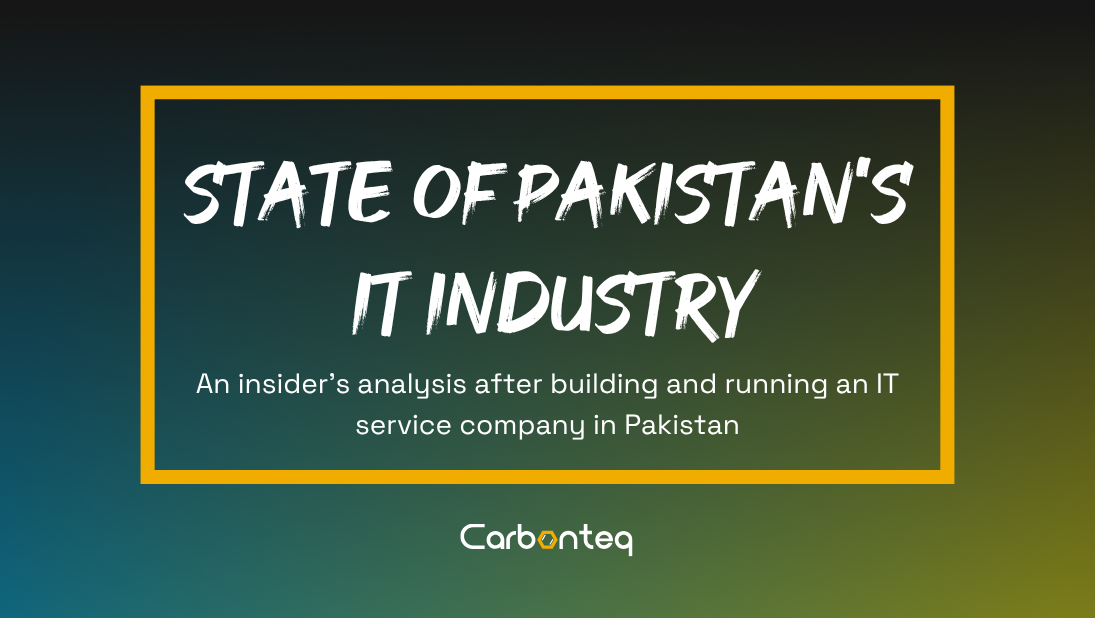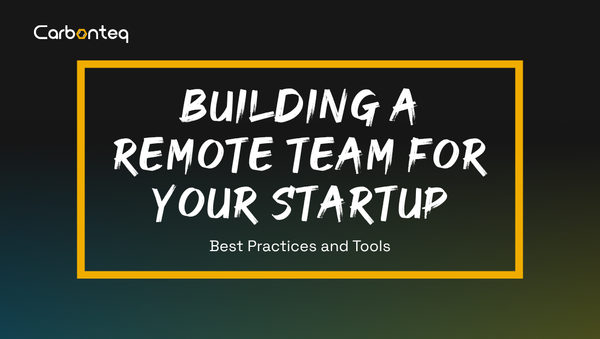State of Pakistan's IT Industry
A brief analysis of Pakistan's IT services sector and the problems which exist in its ecosystem. The motivations behind this article are not to incite fear and despair.

Introduction
A brief analysis of Pakistan's IT services sector and the problems which exist in its ecosystem. The motivations behind this article are not to incite fear and despair. Instead, the focus is on facing the general industry-wide issues along with what the writers have experienced after having worked in the IT services sector since 2014. Being part of the development teams at various US-based startups and then running their own managed IT service company for the past 3 years. Think of this as a wake-up call initiated by the emotional response toward the drawbacks our industry is facing in capturing its true market value. In the hopes of gathering like-minded people who would like to be a part of the change toward better business models for Pakistani IT companies. Along with generating and cultivating talent which would be valuable even without any assistance from predatory organizations which would sacrifice talent over their profits in the blink of an eye. So here we go.
Current Pakistani IT Situation - False Optimism is Being Experienced:
Well if you are an average news freak or a geek, then you would have come across many sources which make it seem like Pakistan’s IT sector is touching greater heights day by day and the sky's the limit for us. However, the real situation is quite different from how our media is portraying it to be. This can be realized from the fact that Pakistan is nowhere to be seen in the World Digital Competitiveness Ranking 2022, which measures the capacity and readiness of economies to adopt and explore digital technologies for economic and social transformation. Furthermore, Pakistan’s IT sector only contributes 1% to its GDP despite having the 5th largest population in the world, with more than 60% of its population comprising of youth. Whereas in very small countries like Singapore, Switzerland, and UAE, ICT contributes to its GDP by more than 17%, 5%, and 10% respectively, despite having a limited talent pool and potential.
If we do not act now, we would not be able to sustain double-digit growth each year in IT exports in the past decade and an 18% plus CAGR. Pakistan’s Vision 2025 and the Digital policy of Pakistan 2018 aim for the ICT industry size to reach $20 billion by 2025. Now, this is just the potential of the market value which we can capture If we can provide quality services through a well-skilled workforce.
One of the Highest Illiteracy Rates in the World:
Approximately more than 40% of the population is categorized as illiterate.
Gender Disparity:
Out of the literate workforce, less than 46.49 percent of women are literate, and more than 69.29 percent of men. Furthermore, out of the total labor force, only 20% are females.
Limited Access to the Internet (Digital Literacy):
Only 54% of the population has access to 3G and 4G networks, 56% have access to broadband internet, or only 1-2 people per 100 have access to fixed broadband internet. And these are just the availability metrics. According to the Inclusive Internet Index which measures the capacity at which nations are utilizing the internet based on the factors of “Availability, Affordability, Relevance, and Readiness”. Despite the rank of 79 globally, Pakistan ranks last out of 22 countries in Asia. Although Pakistan is in 63rd place in its affordability index which is our only strong suit, we still lack behind the world (at 80th place approx.) in Availability, Relevance, and Readiness.
Over-reliance on the Government to flourish the IT Industry of Pakistan:
We depend on the public sector to bring about the changes which the IT industry is facing. However, we are failing to realize that a more collaborative approach is required to overcome barriers. We need to forge deeper Public-Private partnerships to counter the current challenges. As of now, only a handful of public-private partnerships have been formed to tackle the dire situation. Furthermore, the Government has already extended an olive branch to us by not taxing the ICT sector at all, now it is our responsibility to utilize the excessive profits and re-invest them into tackling such challenges faced by our workforce.
Focus on Quantity Rather than Quality:
As per recent surveys, Pakistan’s universities produce around 35,000 IT graduates per annum but merely 5,000 get employed at leading local IT companies since the other graduates do not meet the IT industry criteria because of their irrelevant or outdated education. Furthermore, limited efforts are being made by the public-private sector to overcome this problem, we still have not come up with a global standard institution in the past two years.
There are a few reasons for that which are mentioned below:
- Lack of public-private collaboration to devise a progressive curriculum to tackle the country’s professional and technical needs.
- Lack of focus on identifying and communicating the necessary learning requirements and missing skills, including soft skills.
- No clear direction or roadmap for devising a mechanism to improve the integration of lower-tier universities with industry requirements.
There are significant skills gaps among computer science engineers and professionals that need to be tackled to ensure the future growth of the sector including:
- Inability to code in contemporary technology platforms.
- Weak communication and transferable skills.
- Poor readiness to address foreign clients’ concerns.
- Poor knowledge of corporate culture, e.g. reporting, compliance, escalations, email etiquette, and protocols.
Human Capital (Or, the Lack of it):
Due to unfavorable social, economic, and political conditions, most of the intelligent and skilled people have already left the country for greener pastures thus further complicating the onerous task of finding experienced talent for the organizations. Pakistan has a very small bucket of Human Capital, and that bucket is leaking due to a lack of infrastructure and organizations where that human capital can be cultivated and utilized. In 2022 only, 765,000 highly educated and talented young people have left the country. These are the people who actively gained some hard skills and then could not find any employment opportunities in Pakistan.
Ongoing Talent Wars:
Instead of addressing the root cause of the problems, the industry is fighting over a small pool of resources just to ensure that their profits are maximized. They hardly ever think about creating value for their employees and in doing so they constrain the potential of individuals to learn and grow, and most importantly their innovation and creativity are destroyed slowly over time.
Pakistan’s IT industry is booming, however, this overproduction of inadequate talent and Human capital without any facet for its utility is creating a pothole that is of no use to anyone. The need for good quality developers is increasing day by day, resulting in massive level talent wars, forcing recruiters nowadays to come up with creative tactics to secure available talent in the shortest periods, some of them are:
- Offering above-market salaries.
- Projecting the size of their company.
- Signing Bonuses.
- Bi-Yearly increments.
- Remote work or Work from home opportunities.
- Opening offices in different cities to attract more local talent.
- Offering top-notch Employee benefits (health insurance, provident fund, loan policy, car policy).
- State-of-the-art Employee Rewards and Recognition Plan.
What are we Currently Doing to Counter the Above Challenges, as a Nation?
Well, the good part is that we are not ignoring the above challenges completely.
We are late to the party, but at least we have made it. Efforts have been started by both the public and private sectors in this regard, for instance;
Tech Giants of Pakistan are Launching Their Training Platforms:
Tech giants such as Systems Limited have initiated programs to reskill or upskill fresh graduates. However, the public struggles to stay up with technology trends in a rapidly changing market because fewer private training possibilities are available. Furthermore, the focus of such programs is quantity, not quality, which in the long run is not a sustainable approach at all.
Public Sector is Ramping up its Efforts to Upskill the Masses:
The government has initiated a federal effort to promote technical skills training and formal education. The program's name is “Prime Minister's Youth Program”. Another federal initiative includes Digital Learning and Skills Enrichment Initiative (DLSEI). By Higher Education Commission Pakistan. This program involves a partnership with Coursera and the previous two phases of the program witnessed a cumulative 0.25 million hours of online skilling across 12,000 learners. Its courses include Project Management, Data Analytics, Programming, Social Media Marketing, and soft skills.
Furthermore, the Public sector has also initiated skill-uplifting programs on a provincial level. For instance, in Punjab, a "Punjab Skill Development Fund" has been established which provides technical and vocational training to the majority. Special Emphasis Programme (SEP) has been launched in Khyber Pakhtunkhwa province for vocational training for youth and involves the enrollment of 3,000 students in various institutes.
However, this initiative is also focusing on the quantity of talent and is preparing individuals for basic-level jobs or freelancing. It needs to be tailored as per the industry demand to further capitalize on and achieve its objectives.
And for Those who are Asking “What is Carbonteq Doing About the Whole Situation?"
Carbonteq is building up on its efforts to “ Supercharge STEM Infrastructure & Talent Density in Pakistan” by introducing the following best practices
The core element of IT service provision is the developers/engineers. Carbonteq has taken on the responsibility to hire and train the best possible available talent. As our core team has decades of experience in the IT industry they are aware of the best practices used all around the world. We are leveraging our core team experience to groom emerging talent. When we were deciding on our mission statement we considered all these things and thought of giving back to the community so that other people can benefit from it.
We are focused on the following areas so that anyone working with us would learn the best skills with the latest tools and technologies.
Robust Learning and Development:
We have developed a top-notch learning portal that includes best practices and principles, training exercises, and architectural patterns that can help you produce high-quality, scalable, and maintainable code.
Every employee who joins Carbonteq goes through a rigorous training program so they can compete with any top developer around the world. Through our mentor-driven process, You will develop your skills in best practices, principles, and technology.
Link: https://dev-portal.carbonteq.com/docs/intro
Open Source Program:
We are certain that open source is responsible for the explosion of innovation that we take for granted today. It encourages collaboration, fosters competition, and drives continuous improvement. We are proud to be a part of this very diverse ecosystem, and encourage our developers to take the initiative and come up with ideas that can help the developer community.
Link: https://www.npmjs.com/org/carbonteq
Talent Transformation Program:
As mentioned earlier in our blog that there is a talent shortage, you can say there is a supply-demand issue between universities and the IT industry. We figured out quite early that anyone having a knack for science and math can learn and perform well in the IT industry, given proper guidance and conditions
With this belief, we have developed a program for Pakistani talent in which they can learn software engineering, no matter which discipline they belong to, and add value to our company and the overall IT industry. The program participants are empowered enough to learn about the principles and benchmark practices of software engineering, as well as how to deal with complex engineering situations using industry-standard architectural techniques through tested architectural techniques, all while building a simple app. The program leverages your sense of curiosity and eagerness to excel to enable you to become a force for the greater good.
You all must know that Carbonteq has more than 40% workforce that does not have a hardcore computer science degree, and comprises electrical, mechanical, material engineers, and other non-science professionals. We have several examples where a person shifting from non-IT background to an IT background has outperformed and excelled. Our CEO is a perfect example of that.
Broadcasting Internal Tech Town Hall/Workshops:
We conduct monthly technical and non-technical knowledge-sharing town halls which are converted into articles that are posted on our blog so that others can learn from them too.
Progressive and Visionary HR Mindset:
The majority of organizations are focusing on enhancing profits and expanding regional footprints at the expense of their human resources well-being. However, talent development and sustainability are of paramount importance to us. Our aim to secure a “Top Employer” certification in a short period is proof of our commitment to living up to our mission and values. We are mature enough to understand that profit and growth are a byproduct of overall organizational development, thus a true employee/customer-centric approach is always adopted to ensure that Carbonteq works better than the rest.
Even our new Employee Value Proposition (EVP) is a testament to the fact that our employees and customers always come first. Our EVP is strongly built along three major pillars:
- Wellness
- Partnership
- Innovation
All of which are assisting Carbonteq to achieve its mission. The work landscape, especially in the tech markets is rapidly evolving. Carbonteq is striving to lead from the front by expanding flexibility and providing greater possibilities for advancement and skill development. In a nutshell, we are amongst the cohort of companies that are proactive in their employee's and customers' needs and are laying a solid foundation for navigating through these innovations and developments. Our leadership is continuously putting in efforts to build a more diverse, inclusive, and equitable environment for our employees and customers, who are our true partners; and our exceptional score in the recent employee engagement survey at Carbonteq is proof of our commitment to achieve excellence.
Now to put the cherry on top of the cake, our journey does not stop at putting these fancy, sellable ideas on a piece of paper. We are continuously adding scalable, sustainable systems and procedures to our framework to achieve our goal of developing our workforce. Which means implementation of the right and relevant ERPs, use of a Learning Management System, Progression and Competency Framework, talent programs, feedback surveys, Resource and Succession Planning tools, etc. Our partners are proving to be crucial to such implementation. Their valuable suggestions through our regular ongoing surveys and channels are being continuously captured and implemented. We firmly believe that the more collaborative and growth-oriented culture we promote, the more closer we will get to our mission success.
What More will Carbonteq be Doing in the Future?
Ambassador Program
Our main purpose is to create awareness and bridge gaps between academia and industry. Our Ambassadors with our help will be conducting workshops and seminars in their respective institutions, they will talk about upcoming technologies and trends. They will be motivating other undergraduate students to learn new skills and how they can add value to our growing industry.
Scholarships for Undergraduates:
Carbonteq is coming up with a plan to award scholarships to deserving students so that they can focus on their studies rather than worrying about tuition fees.
3rd-Year Internship Program:
We will be launching a program that will be for undergraduate students who have completed their 3rd year. We will provide them with internship opportunities and we will also help them with final-year projects(if they have some crazy idea). This program will help them to decide what they want to do after they graduate.
Open Challenges:
We will be conducting open challenges next year so that anyone can participate and get rewarded for their hard work. We have a few ideas in mind there will be more ideas coming up.
1. RTMP relay with low memory footprint and WASM bindings (1 million pkr prize).
2. React Skia Renderer (1 million pkr prize).
Building the Developer Finance Guide for the Local Market:
The Developer Finance Guide will contain carefully curated content to help you navigate the world of personal finance. As you progress through your career as a developer, your financial position will change and so will your questions about money.
This guide will aim to answer those personal finance questions that are top-of-mind - whether that be how to maximize tax rebates while working from home, figuring out how your salary compares to other developers, or how you can better customize your banking.
Link: https://www.developersfinance.guide/docs/about/about-intro
If you liked our take on the state of our IT sector, make sure to comment with your thoughts on it or just mention something we might have missed.
P.S. This is just the beginning, we will be conducting further research into these issues to come up with possible solutions. The findings will be published so that others can learn from them too.



